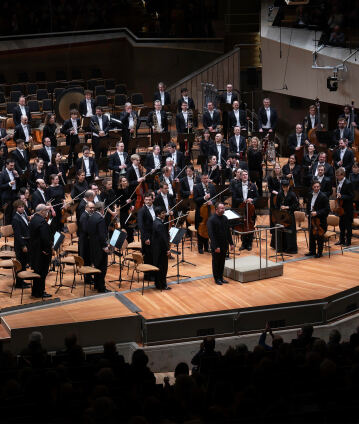Kirill Petrenko with Rachmaninov’s “Francesca da Rimini”

In his one-act opera Francesca da Rimini, Sergei Rachmaninov uses bold colours to create a bleak world of hatred, jealousy and loss. Against this backdrop, the heroine’s brief romance shines all the more brightly. Chief conductor Kirill Petrenko presents the powerful score in a concert performance. The concert begins with Samuel Barber’s melancholy Adagio for Strings and Sofia Gubaidulina’s The wrath of God, a work of almost apocalyptic drama.
The title of Sofia Gubaidulina’s The Wrath of God – written for the Beethoven 2020 anniversary year – is to be understood literally: God’s wrath mercilessly descends on mankind with the full force of sound. The reason is the “rise of hatred”, according to the composer, “I recognise this in the global situation, in a general excess of tension in civilisation”. At the same time, her work answers the question “Muss es sein?” (Must it be?) raised by Beethoven in his String Quartet No. 16 with a clear answer: No, this maniacal hatred doesn’t have to be.
Beyond his native Russia, Sergei Rachmaninov is primarily known as a composer of piano and orchestral works. However, he also left behind an extensive oeuvre of vocal music, including three short operas. Rachmaninov gained experience in music theatre as the conductor of a private opera house in Moscow and, from 1904, as the conductor of the Bolshoi Theatre. The two one-act operas The Miserly Knight after Pushkin, and Francesca da Rimini, presented here in a concert version by Kirill Petrenko, were premiered on one evening at this famous theatre in 1906.
The work is based on Dante’s Divine Comedy. Together with his colleague Virgil, the poet meets the lovers Francesca and Paolo in hell. Lanciotto Malatesta, Francesca’s husband and Paolo’s brother, caught them together red-handed and stabbed them to death. Rachmaninov composed music to accompany the plot, which is framed by a prologue and an epilogue, which evokes a unique mood of hopelessness with its toned-down instrumental colours, textless choral singing and the passionate intensity of the love scene. Dante’s often repeated verse “there is no greater sorrow than to recall happiness in times of misery” could be written about Rachmaninov’s music, which draws a considerable part of its beauty by looking back wistfully to the Romantic era.
© 2025 Berlin Phil Media GmbH
Related interviews
Category
Artists
Our recommendations
- Kirill Petrenko conducts Tchaikovsky’s “Queen of Spades”
- Kirill Petrenko conducts Tchaikovsky’s “Queen of Spades” in Baden-Baden
- Kirill Petrenko conducts Strauss’s “Elektra”
- Kirill Petrenko conducts Strauss’s “Elektra” at the Easter Festival in Baden-Baden
- Kirill Petrenko conducts Strauss’s “The Woman without a Shadow”
- “La Damnation de Faust” with Simon Rattle, Joyce DiDonato and Charles Castronovo